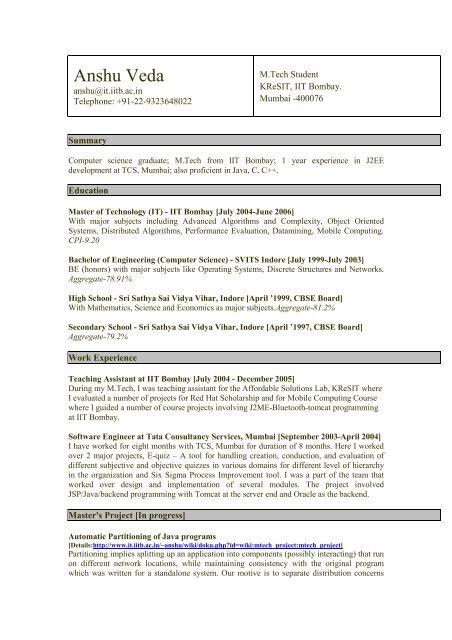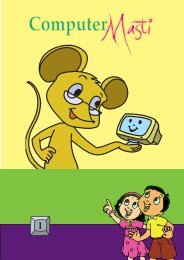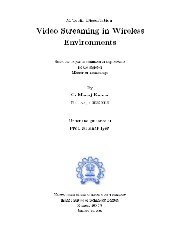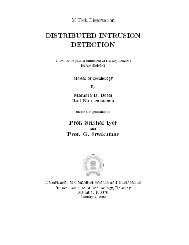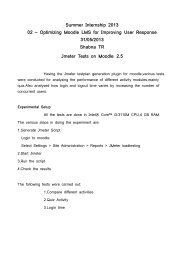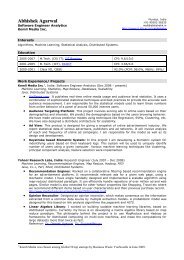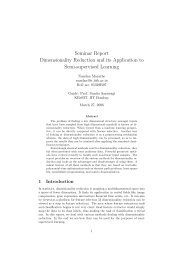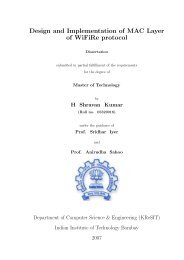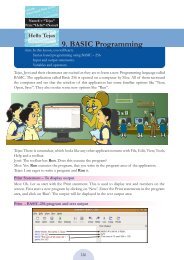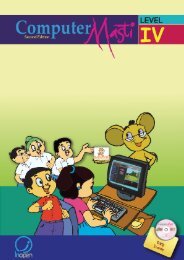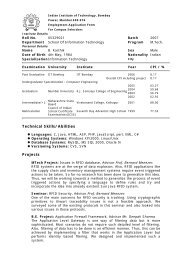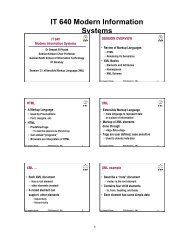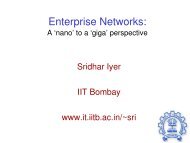Anshu Veda - KReSIT
Anshu Veda - KReSIT
Anshu Veda - KReSIT
Create successful ePaper yourself
Turn your PDF publications into a flip-book with our unique Google optimized e-Paper software.
<strong>Anshu</strong> <strong>Veda</strong><br />
anshu@it.iitb.ac.in<br />
Telephone: +91-22-9323648022<br />
M.Tech Student<br />
<strong>KReSIT</strong>, IIT Bombay.<br />
Mumbai -400076<br />
Summary<br />
Computer science graduate; M.Tech from IIT Bombay; 1 year experience in J2EE<br />
development at TCS, Mumbai; also proficient in Java, C, C++.<br />
Education<br />
Master of Technology (IT) - IIT Bombay [July 2004-June 2006]<br />
With major subjects including Advanced Algorithms and Complexity, Object Oriented<br />
Systems, Distributed Algorithms, Performance Evaluation, Datamining, Mobile Computing.<br />
CPI-9.20<br />
Bachelor of Engineering (Computer Science) - SVITS Indore [July 1999-July 2003]<br />
BE (honors) with major subjects like Operating Systems, Discrete Structures and Networks.<br />
Aggregate-78.91%<br />
High School - Sri Sathya Sai Vidya Vihar, Indore [April ’1999, CBSE Board]<br />
With Mathematics, Science and Economics as major subjects.Aggregate-81.2%<br />
Secondary School - Sri Sathya Sai Vidya Vihar, Indore [April ’1997, CBSE Board]<br />
Aggregate-79.2%<br />
Work Experience<br />
Teaching Assistant at IIT Bombay [July 2004 - December 2005]<br />
During my M.Tech, I was teaching assistant for the Affordable Solutions Lab, <strong>KReSIT</strong> where<br />
I evaluated a number of projects for Red Hat Scholarship and for Mobile Computing Course<br />
where I guided a number of course projects involving J2ME-Bluetooth-tomcat programming<br />
at IIT Bombay.<br />
Software Engineer at Tata Consultancy Services, Mumbai [September 2003-April 2004]<br />
I have worked for eight months with TCS, Mumbai for duration of 8 months. Here I worked<br />
over 2 major projects, E-quiz – A tool for handling creation, conduction, and evaluation of<br />
different subjective and objective quizzes in various domains for different level of hierarchy<br />
in the organization and Six Sigma Process Improvement tool. I was a part of the team that<br />
worked over design and implementation of several modules. The project involved<br />
JSP/Java/backend programming with Tomcat at the server end and Oracle as the backend.<br />
Master's Project [In progress]<br />
Automatic Partitioning of Java programs<br />
[Details:http://www.it.iitb.ac.in/~anshu/wiki/doku.php?id=wiki:mtech_project:mtech_project]<br />
Partitioning implies splitting up an application into components (possibly interacting) that run<br />
on different network locations, while maintaining consistency with the original program<br />
which was written for a standalone system. Our motive is to separate distribution concerns
from the application development. Writing program considering distribution aspects<br />
beforehand increases the complexity of program to a great extent. Modifying existing sources<br />
to enable execution in a distributed environment involves a lot of re-coding. In addition, we<br />
consider the scenario where the deployment settings can vary time and again. Given an<br />
existing Java code, designed, coded, debugged and tested for executing on a standalone<br />
computer we want to partition it in a transparent fashion. This is desirable for usual benefits<br />
of distributed systems like those of efficient resource utilization and reduced network traffic.<br />
Automation of such process will reduce the burden of developers to a great extent I have been<br />
working under the guidance of Professor Sridhar Iyer on this problem.<br />
Course Projects [During the M.Tech]<br />
A Virtual Classroom [Systems Laboratory Course]<br />
This is an ongoing project at IITB being sponsored by Intel. This project aims at putting<br />
together an integrated e-Learning environment for a university student. This will mainly be<br />
used by distance education programs offered by institutes, in order to enable students to avail<br />
of the academic facilities from any computer connected to the internet. As a part of first phase<br />
team for this project we were involved in the design and set up of the server side architecture<br />
as well as server configuration which involved setting up JBoss4.0.1 and Postgres8.1<br />
configuration. We coded a number of modules. We used server side EJBs and integrated it<br />
with Java -Swing client.<br />
XML Diff and Merge tool [Foundation Laboratory Course]<br />
This project involved the development of a tool that could generate and display the<br />
differences between two xml files and if needed merge them via a web-interface. It identifies<br />
the differences to a specified nesting level. The tool was built using java, XML, X-path APIs<br />
and JSP with tomcat server.<br />
Implementation of Distributed Phase Commit [Implementation of Database<br />
Management Techniques]<br />
Here we implemented a multi-threaded version of 1-2 Phase commit algorithms to enable<br />
consistent commit in Distributed Database scenario in C.<br />
Solving Feature Interaction Problems using Java Filter Objects [Object Oriented<br />
Systems]<br />
Feature Interaction problems refer to scenarios that arise when support of one feature in a<br />
system conflicts with other features. We designed solutions to some such problems and<br />
implemented the same in translator for Java filters (TJF) - an extension to java that supports<br />
filter objects, developed at IIT, Bombay (http://www.cse.iitb.ac.in/~rkj/filter.html).<br />
Intrusion Detection System [Datamining Course]<br />
The goal was to come up with an anomaly-detection based IDS. We tried to incorporate both<br />
network-based and host-based detection techniques using different clustering (K-Means) and<br />
classification (KNN, Decision trees) approaches to suggest an appropriate algorithm for IDS.<br />
Our system was tested on IITB network logs.<br />
Simulation of Distributed Fair Queue Scheduling in WLANs [Performance Evaluation<br />
Course]<br />
Here we simulated the execution of a published scheduling algorithm for 802.11b WLAN<br />
scenario in Java. This gave us a feel of different aspects of simulation including the<br />
maintenance of virtual clock, simulating queues and analyzing the system for parameters like<br />
throughput, fairness etc, in addition to the understanding of how simulating a scenario is<br />
different from actual implementation.
Seminars and Presentations [During the M.Tech]<br />
Localization and Root Cause Isolation of Faults in Large-scale systems [Seminar<br />
M.Tech Course]<br />
Localization involves mapping of faults to components, given some logs say for example the<br />
set of requests failed, whereas root cause isolation involves mainly dependency analysis over<br />
the set of failed components to determine the actual faulty component. Here we surveyed all<br />
the available techniques in literature for dealing with this problem which involved – using<br />
clustering, decision trees and some other datamining techniques for localization as well graph<br />
algorithms for dependency analysis.<br />
Search Mechanisms for Peer-to-Peer Systems [Distributed Algorithms Course]<br />
Searching and information retrieval is an important problem in peer to peer systems due to<br />
their decentralized nature. We wrote a term-paper comparing the existing techniquesvariations<br />
of BFS (e.g. iterative deepening), dynamic search, and multi-agent system based<br />
algorithms.<br />
Data Aggregation, Query Processing and Routing in Sensor Networks [Mobile<br />
Computing Course]<br />
We wrote a term paper surveying the available protocols for data aggregation, queryprocessing<br />
and routing, their usability and tradeoffs.<br />
B.E. Project [July 2002-March 2003]<br />
Framework for Bayesian Learning and Inference<br />
Bayesian Belief networks are graphical models used as an important classification technique<br />
in datamining algorithms. Given a large dataset representing the problem domain, we tried to<br />
implement an efficient learning algorithm to learn the Bayesian belief network representing<br />
the dependencies between the system variables and their probability distributions. This learnt<br />
graph could then subsequently used by the inference engine where the effect on distribution of<br />
other variables could be calculated given some evidence. Such a framework was targeted for<br />
problems like those of Market-Basket Analysis.<br />
Skills and Interests<br />
Languages<br />
C/C++, Java, VB.<br />
Scripting languages<br />
Bash scripting, Perl, PHP, CGI.<br />
Other tools and technologies<br />
J2ME, JSP, EJB, ns-2, OPNET, Qualnet.<br />
Platforms<br />
Linux, Windows, J2EE<br />
Interests<br />
Distributed Systems, Object Oriented Systems, Wireless Networks, Datamining and AI.<br />
References<br />
Available on request


